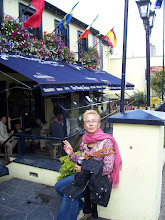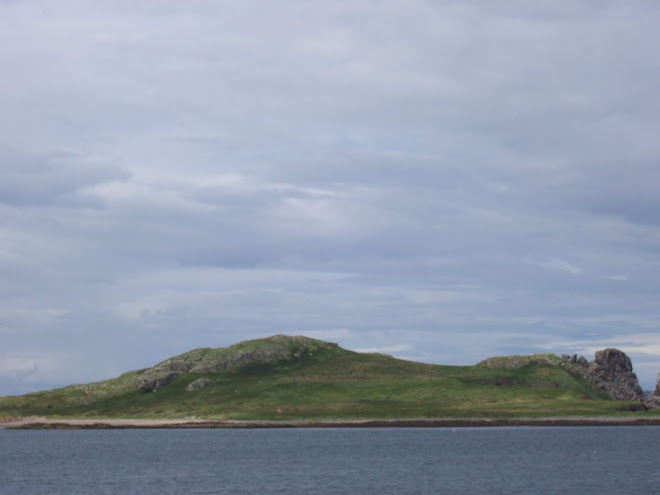 Ireland’s tradition of being a nation of scholars goes back over a thousand years to when monks began transcribing the Bible into great works of art. Ireland was one of the first nations to practice vernacular writing.
Ireland’s tradition of being a nation of scholars goes back over a thousand years to when monks began transcribing the Bible into great works of art. Ireland was one of the first nations to practice vernacular writing.Dublin’s most visible impact on world literature began in the 18th Century in the form of Anglo-Irish. Trinity College, Dublin, has produced many writers. Here you may see the Book of Durrow and Book of Kells which are transcriptions of the Bible.
Ireland’s first great writer recognized internationally was Jonathan Swift , author of "Gullivers Travels" .
Oliver Goldsmith , author of "The Vicar of Wakefield", who dominated theatre in England at the time, was also from Dublin.
Bram Stoker, born in 1847 in Clontarf is undoubtedly Ireland’s most famous horror writer. He wrote several short stories, novels and essays but his name is linked with "Dracula" .
Many of Ireland’s eminent writers were born in the 19th Century. Oscar Wilde : "An Ideal Husband", "The Importance of Being Earnest" and "The Picture of Dorian Gray" have enshrined him as Ireland’s greatest satirist. His home for many years may be seen still in Merrion Square .
George Bernard Shaw was awarded the Nobel Prize for Literature in 1925 for his contribution to literature and an Oscar (1938) for "Pygmalion". He was a strong advocate for socialism and women's rights.
WB Yeats , winner of the Nobel Prize for Literature in 1923. He became an Irish Nationalist who dreamt of Irish Independence. One of his most quoted poems is "Easter 1916".
James Joyce born in Dublin, noted for his experimental use of language in such works as "Ulysses".
Samuel Beckett's particular minimalist style of writing has left its permanent mark on world literature. Beckett was awarded the Nobel Prize for Literature in 1969.
Flann O'Brien was another of Dublin’s literary geniuses to emerge in the mid 20th Century.
The Dublin literary tradition continues and more recently Irish writers of importance and popularity have lived here such as Seanus Heaney, 1995 winner of the Nobel Prize for Literature, 1995, who lives in Sandymount.
Michael Longley, a famous Irish poet from Belfast who taught in Dublin and now lives in County Mayo, Eavan Boland, the famous feminist poet and Maeve Binchy, the popular novelist who lives in Dalkey, Co. Dublin.
La tradición de que Irlanda es una nación de eruditos se remonta a miles de años , cuando los monjes comenzaron a transcribir la Biblia en grandes obras de arte. Irlanda fue una de las primeras naciones en usar la escritura vernácula.
El impacto más visible de Dublín en la literatura universal empezó en el siglo XVIII en Anglo-Irlandés. El Trinity College, Dublín, ha producido muchos escritores. En el Trinity College se puede ver el Libro de Durrow y el Libro de Kells, que son transcripciones de la Biblia.
El primer gran escritor irlandés reconocido internacionalmente fue Jonathan Swift autor de "Los viajes de Gulliver".
Oliver Goldsmith autor de "El vicario de Wakefield", que dominó el teatro de Ingalterra en la época, era también de Dublín.
Bram Stoker , nacido en en 1847, en Clontarf, es sin duda el escritor de terror más famoso de Irlanda. Escribió varias historias cortas, novelas y ensayos, pero su nombre está unido a "Drácula".
Muchos de los eminentes escritores irlandeses nacieron en el siglo XIX :
- Oscar Wilde: "Un marido ideal", "La importancia de llamarse Ernesto" y "El retrato de "Dorian Gray" lo han consagrado como el satírico más importante de Irlanda . La que fue su casa durante muchos años, puede aún verse en Merrion Square, Dublin.
- A George Bernard Shaw se le concedió el Premio Nobel de literatura en 1925 por su contribución a la literatura y un Oscar por "Pygmalion". Fue un gran defensor del socialismo y de los derechos de la mujer.
- W.B. Yeats ganador del premio Nobel de literatura en 1923. Se convirtió en un nacionalista irlandés que soñaba con la independencia. Uno de sus poemas más citados es " Easter 1916"
- James Joyce , nacido en Dublín, notable por su uso experimental del lenguaje en obras como el "Ulysses".
- El particular estilo minimalista de escribir de Samuel Beckett ha dejado su marca permanente en la literatura mundial. A Beckett se le concedió el premio Nobel de literatura en 1969.
Flann O'Brien fue otro de los genios literarios de Dublín que surge en la mitad del siglo XX.
La tradición literaria de Dublín continúa y más recientemente escritores irlandese de importancia y popularidad han vivido aquí, como Seanus Heaney, ganador del premio Nobel de literatura en 1995, que vive en Sandymount.
Michael Longley , famoso poeta irlandés de Belfast, que enseño en Dublín y ahora vive en el condado de Mayo. Eavan Bolan , la famosa poeta feminista y Maeve Binchy , novelista popular que vive en Dalkey, Co Dublín.
.jpg)

.jpg)
No hay comentarios:
Publicar un comentario